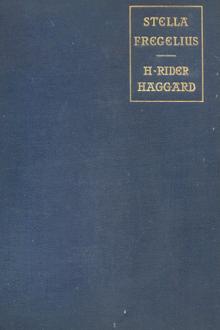The Story of the Volsungs (Volsunga Saga); with Excerpts from the Poetic Edda, - [e book reading free .txt] 📗

- Author: -
Book online «The Story of the Volsungs (Volsunga Saga); with Excerpts from the Poetic Edda, - [e book reading free .txt] 📗». Author -
Now Hogni had a son left alive, hight Niblung, and great wrath of heart he bare against King Atli; and he did Gudrun to wit that he would avenge his father. And she took his words well, and they fell to counsel together thereover, and she said it would be great goodhap if it might be brought about.
So on a night, when the king had drunken, he gat him to bed, and when he was laid asleep, thither to him came Gudrun and the son of Hogni.
Gudrun took a sword and thrust it through the breast of King Atli, and they both of them set their hands to the deed, both she and the son of Hogni.
Then Atli the king awoke with the wound, and cried out; "no need of binding or salving here!—who art thou who hast done the deed?"
Gudrun says, "Somewhat have I, Gudrun, wrought therein, and somewhat withal the son of Hogni."
Atli said, "Ill it beseemed to thee to do this, though somewhat of wrong was between us; for thou wert wedded to me by the rede of thy kin, and dower paid I for thee; yea, thirty goodly knights, and seemly maidens, and many men besides; and yet wert thou not content, but if thou should rule over the lands King Budli owned: and thy mother-in-law full oft thou lettest sit a-weeping."
Gudrun said, "Many false words hast thou spoken, and of naught I account them; oft, indeed, was I fell of mood, but much didst thou add thereto. Full oft in this thy house did frays befall, and kin fought kin, and friend fought friend, and made themselves big one against the other; better days had I whenas I abode with Sigurd, when we slew kings, and took their wealth to us, but gave peace to whomso would, and the great men laid themselves under our hands, and might we gave to him of them who would have it; then I lost him, and a little thing was it that I should bear a widow's name, but the greatest of griefs that I should come to thee—I who had aforetime the noblest of all kings, while for thee, thou never barest out of the battle aught but the worser lot."
King Atli answered, "Naught true are thy words, nor will this our speech better the lot of either of us, for all is fallen now to naught; but now do to me in seemly wise, and array my dead corpse in noble fashion."
"Yea, that will I," she says, "and let make for thee a goodly grave, and build for thee a worthy abiding place of stone, and wrap thee in fair linen, and care for all that needful is."
So therewithal he died, and she did according to her word: and then they cast fire into the hall.
And when the folk and men of estate awoke amid that dread and trouble, naught would they abide the fire, but smote each the other down, and died in such wise; so there Atli the king, and all his folk, ended their life-days. But Gudrun had no will to live longer after this deed so wrought, but nevertheless her ending day was not yet come upon her.
Now the Volsungs and the Giukings, as folk tell in tale, have been the greatest-hearted and the mightiest of all men, as ye may well behold written in the songs of old time.
But now with the tidings just told were these troubles stayed.
CHAPTER XL. How Gudrun cast herself into the Sea, but was brought ashore again.
Gudrun had a daughter by Sigurd hight Swanhild; she was the fairest of all women, eager-eyed as her father, so that few durst look under the brows of her; and as far did she excel other woman-kind as the sun excels the other lights of heaven.
But on a day went Gudrun down to the sea, and caught up stones in her arms, and went out into the sea, for she had will to end her life. But mighty billows drave her forth along the sea, and by means of their upholding was she borne along till she came at the last to the burg of King Jonakr, a mighty king, and lord of many folk. And he took Gudrun to wife, and their children were Hamdir, and Sorli, and Erp; and there was Swanhild nourished withal.
CHAPTER XLI. Of the Wedding and Slaying of Swanhild.
Jormunrek was the name of a mighty king of those days, and his son was called Randver. Now this king called his son to talk with him, and said, "Thou shalt fare on an errand of mine to King Jonakr, with my counsellor Bikki, for with King Jonakr is nourished Swanhild, the daughter of Sigurd Fafnir's-bane; and I know for sure that she is the fairest may dwelling under the sun of this world; her above all others would I have to my wife, and thou shalt go woo her for me."
Randver answered, "Meet and right, fair lord, that I should go on thine errands."
So the king set forth this journey in seemly wise, and they fare till they come to King Jonakr's abode, and behold Swanhild, and have many thoughts concerning the treasure of her goodliness.
But on a day Randver called the king to talk with him, and said, "Jormunrek the King would fain be thy brother-in-law, for he has heard tell of Swanhild, and his desire it is to have her to wife, nor may it be shown that she may be given to any mightier man than he is one."
The King says, "This is an alliance of great honour, for a man of fame he is."
Gudrun says, "A wavering trust, the trust in luck that it change not!"
Yet because of the king's furthering, and all the matters that went herewith, is the wooing accomplished; and Swanhild went to the ship with a goodly company, and sat in the stern beside the king's son.
Then spake Bikki to Randver, "How good and right it were if thou thyself had to wife so lovely a woman rather than the old man there."
Good seemed that word to the heart of the king's son, and he spake to her with sweet words, and she to him in like wise.
So they came aland and go unto the king, and Bikki said unto him, "Meet and right it is, lord, that thou shouldst know what is befallen, though hard it be to tell of, for the tale must be concerning thy beguiling, whereas thy son has gotten to him the full love of Swanhild, nor is she other than his harlot; but thou, let not the deed be unavenged."
Now many an ill rede had he given the king or this, but of all his ill redes did this sting home the most; and still would the king hearken to all his evil redes; wherefore he, who might nowise still the wrath within him, cried out that Randver should be taken and tied up to the gallows-tree.





Comments (0)